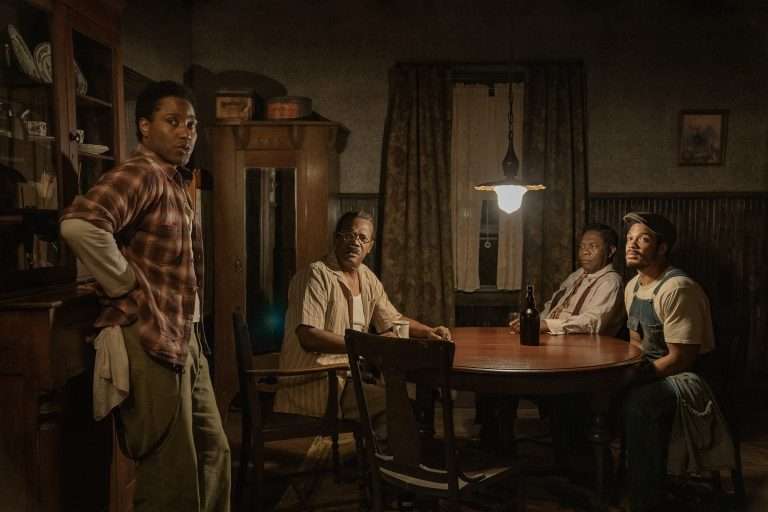Love is at the center of Jude Chehab’s debut directorial, Q. All its layers and implications are slowly ripped apart as Chehab probes the impact the Syrian women’s religious order, Qubaysiat, had on her family. This is an intergenerational project Chehab has embarked on, and one can notice some tension in the film about what it exactly wishes to be. There is a faintly perceptible inclination towards being an expose of a fiercely clandestine cult, but Chehab wisely resists it very early on in the film.
She is more interested in excavating the roots of trauma, denial, devotion, and toxic, blinded attachment that the Qubaysiat cultivated in her mother, Hiba, and her grandmother/Teta. The film opens itself up elegantly and somberly, transforming continually into a profound and exceptionally candid deep dive into the most corrosive kind of love and the “secrets of the soul” that one sometimes entrusts to the other, drawn headily into a circle of belief and total trust.
Hiba has received letters from the forbiddingly austere outfit and its female leader, who she addresses as the Anisa. The letters portend that there will be no peace with Hiba’s acts of defiance. The Qubaysiat has laid the rules of religion, and they threaten her that they won’t let her off the hook easily since she has deviated. Chehab observes the nervousness that Hiba tries to suppress in vain with a smile as she talks about receiving the letter, sidestepping any mention of names that they had been categorically schooled to do.
The terrifically private group casts a hovering shadow over the film and the three generations of women whose voices Chehab has sought to incorporate, and interlace, herself included. The group has had decades and decades of linkages with Chehab’s family, beginning with Teta. Hiba was accepted into medical school, but the group started to insist on inducting her into its fold. Despite knowing the damage it’d go on to make in her daughter’s life, Teta insists she has no remorse for giving over Hiba into their aegis. “How could anyone regret their daughter being a part of such a faith?” she asserts. The Qubaysiat raised Hiba.
Teta herself began wearing hijab only after she gave birth to Hiba’s brother, notably after she joined the group. She recounts how she escaped after sitting in for the first lesson but soon returned, gradually developing what she describes as a beautiful attachment. What Chehab especially excels in is extracting the rich complexity of this attachment that haunts Teta and Hiba, the slippages and ambivalences in their vocabularies while talking about the group’s role in their lives, determining how they viewed love and the very demands it made.
The group and Anisa’s philosophies became the bedrock of their foundational understanding of love, spiritual guidance, vis-a-vis notions of finding beauty in love, and vice versa. The charisma Anisa wielded on the girls under her tutelage was so electric and overbearingly intense anyone could become so entwined in their love for her that their entire living would be mediated on that sole axis of what she held and established as customary. “You’d live for her; you’d cry if she got mad at you or if your mother didn’t let you go to the lessons… This love, where you can do anything, is very dangerous”, Hiba reminisces, with a cautionary edge to her voice.
The Anisa inveigled the women into a rigorous, homogenizing code of conduct and attire, a stringent, abstemious lifestyle, half of which was pledged to prayer. The sway she commanded over the women was staggering. “When she entered the room, it was as if the sun had entered the room,” Hiba remarks. Deeply entranced, she wrote passionate poems to her. Chehab smartly cuts next to a short scene, framed from above, of two kids playing with a flag and chanting for the revolution and the collapse of the regime. They shriek excitedly that they will not let anyone pass but look on helplessly, sedentarily, as a man casually cycles right past them.
Q purposefully asserts the positionality of Hiba’s zealous love for Anisa vis a vis Hiba’s relationship with her husband, Ziad. Hiba says, referring to the women of the group, “No one loved the way we did.” At one point, Ziad wistfully comments that for the thirty years, she has been married to him, it felt like she was instead married to the group, her entire life circling it. Chehab nudges him about his more intimate thoughts; he keeps evading, maintaining he was not privy to details.
The director and daughter press this point further, posing a quiet interrogation into how Hiba kept such an inextricably wound-up facet of her life from her husband. It seems like an undiscussed, mutually accepted pact of their lives. Ziad respects Hiba’s unwavering devotion to Anisa and pokes no further questions into this form and reach of love.
Yet, at the point at which Chehab is filming her mother, Hiba is no longer a part of the group, and we sense in her an exasperation with Ziad for not prodding into how much she has been shaken after she was chucked out of it. Ziad is on a tightrope, and Chehab beautifully, subtly weighs this emotional dilemma in the scenes between her parents. There is a lovely, endearing moment when Ziad mock-repeats the evening prayer call, and the couple shares a laugh.
By interposing archival footage and pictures from both her and her mother’s youth, Chehab cleaves out a throughline of devotion handed down in her family and the mesh of resentment and abiding affection in their emotional connection to the group. There are also strikingly lyrical, enigmatic tableaus of women in black, caught in some sort of spiritual, existential limbo. However, in several scenes, William Ryan Fritch’s music comes off as an excessive prop.
Q is a complex unearthing of the knot of thorny feelings, both the warm regard and that tinge of alienation the women experience when they look back at what the group did to them and defined the contours of their existence. Their sentiments towards the outfit are not in clear-cut binaries but one that constantly melds the most oppositional attitudes. There is a longing for those group lessons but also a realization of the unfathomable loss of the many years spent in service. Only through this endeavor Hiba seems to identify, place, and reckon strongly with the Qubaysiat for the first time. She wonders now if what Anisa did and proscribed her from was right at all; she concedes these are difficult questions for her to ask.
Astutely attuned to all the ambiguities that bubble up as Hiba and Teta speak about their engagement with the group, Chehab’s film teases out the interplay between fidelity and forgiveness in myriad, emotionally incisive ways, building onto a life-affirming coda.
Q screened at the 2023 Sheffield DocFest
Q (2023) Links: IMDb, Sheffield DocFest
Director: Jude Chehab
Language: Arabic, English
Runtime: 92 Minutes
Editor: Fahad Ahmed
Cinematography: Jude Chehab






![Sertania [2020] ´CIFF´ Review – A Symbolic and Experimental Western](https://79468c92.delivery.rocketcdn.me/wp-content/uploads/2020/10/Sertania-1-higonfilms-768x269.jpg)

